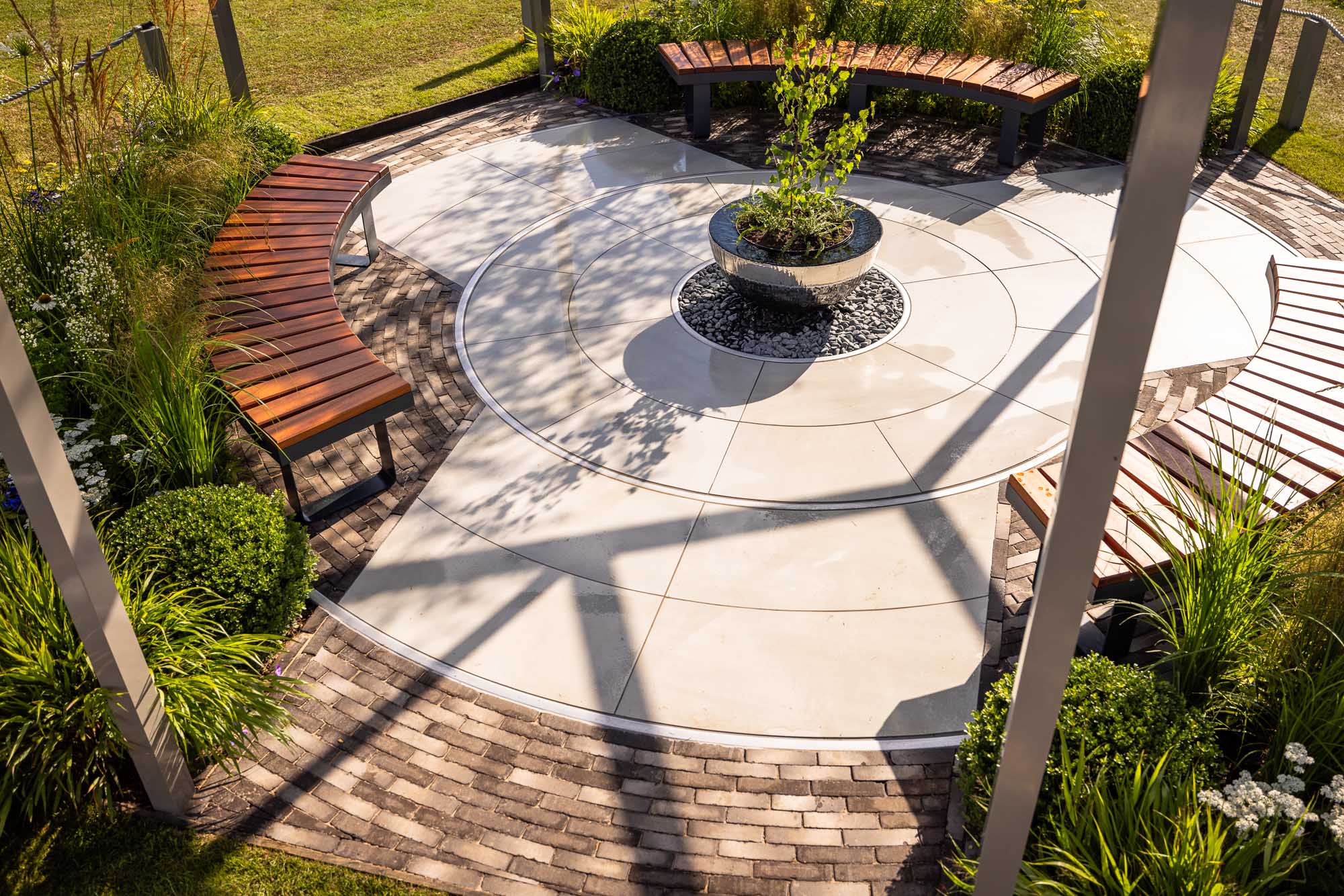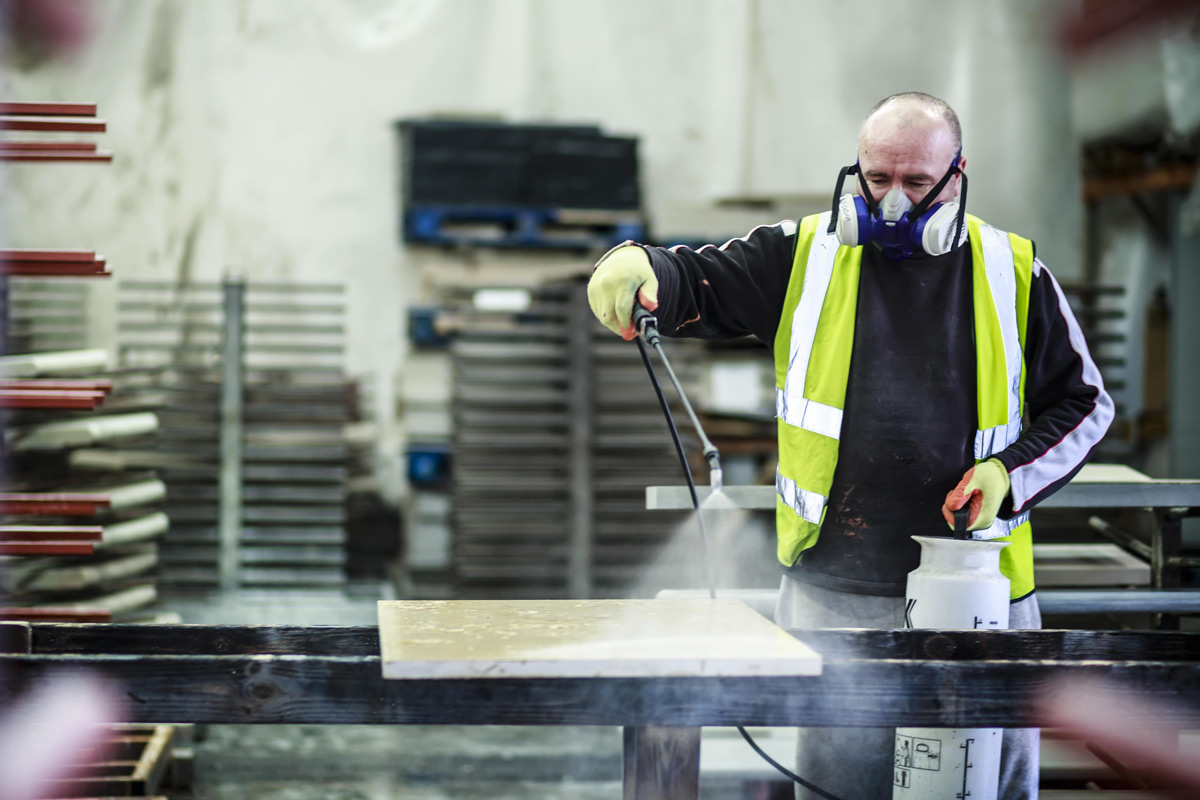Once upon a time, porcelain patio tiles were considered a niche product, perfect for a contemporary pocket garden but not much else. How things have changed!
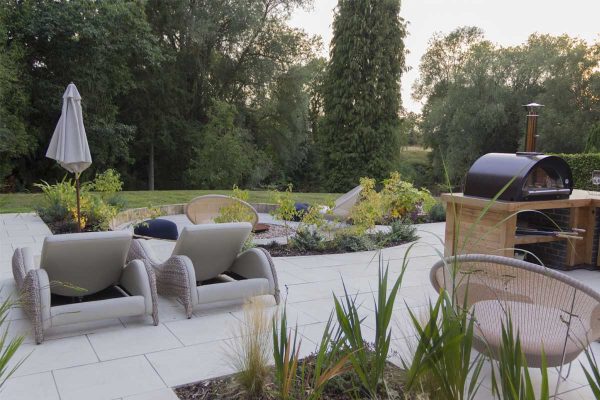
Many designers and landscapers now choose porcelain paving for patios over natural stone time and again.
Here’s why.
Great for Patio Design
Colour options
You’ll never run out of ideas with porcelain. Our range has been chosen to provide paving for virtually every look, from evoking the urban chic of concrete to creating the impression of Jura limestone.
Colours are available from the darkest black to the brightest cream. You can even choose to design with design with wood effect paving.
Colour consistency
Colouring is highly consistent and looks very similar wet or dry. This is a real bonus for designs where tones need to be precisely matched, or if you don’t like the natural variation in stone.
Paler porcelain, because of its tight, even texture, will subtly reflect strong colours nearby. This allows your installation to take on a unique character and adds an extra dimension to the setting.
Range of prices
However much you have to spend, there's likely to be a colour ready and waiting, from our extensive budget-conscious Project Porcelain range to the varied colours and textures of Luxury Italian.
Crisp, contemporary lines
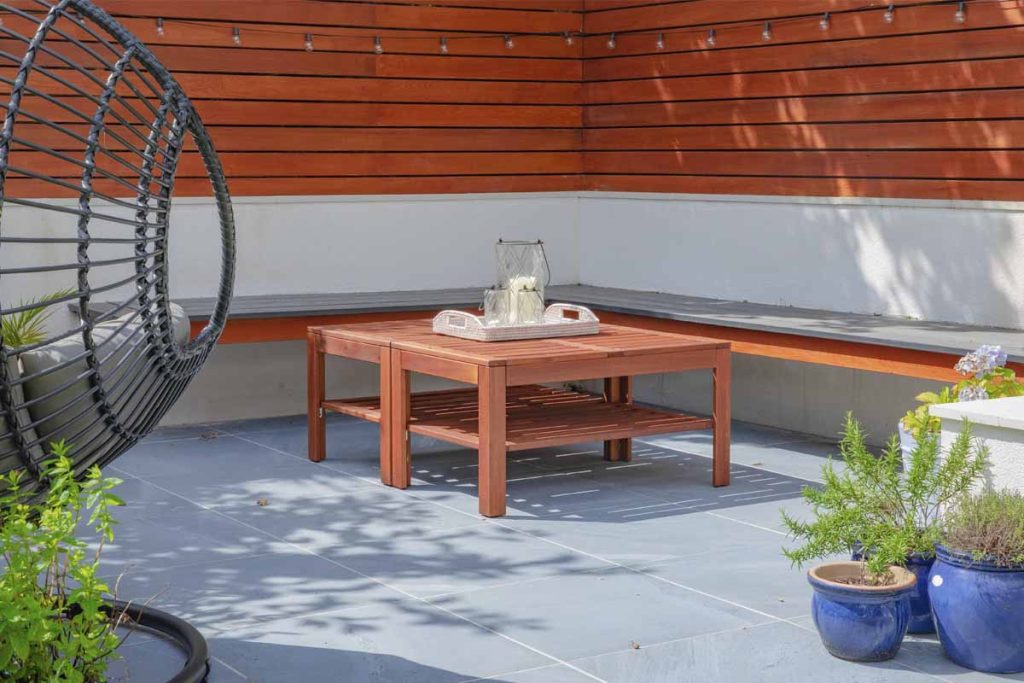
Because our porcelain paving for patios is precision-cut, with no tolerance on most slab sizes, they can be laid with tile spacers, ensuring ultra-even pointing. This maintains the very crisp lines that are so desirable for contemporary designs.
Choice of finish
So much choice. Wood-effect textures, supplied in linear format, are an increasingly popular alternative to decking. Textures imitate flamed, sandblasted and raked natural stone finishes. Indeed, porcelain can emulate natural stone characteristics, down to colour shading, veining and fossilisation, offering a realistic alternative to natural stone with none of the maintenance requirements.
Lower maintenance
Let's dispel a myth. You'll sometimes find suppliers pushing porcelain as a zero-maintenance paving. It isn't. Even porcelain gets dirty and will require periodic cleaning. However, while a natural stone paving might need specialist treatment, cleaning porcelain might only need a jet wash or stiff brush and water to return to its "just-laid" good looks.
Technical advantages of porcelain paving
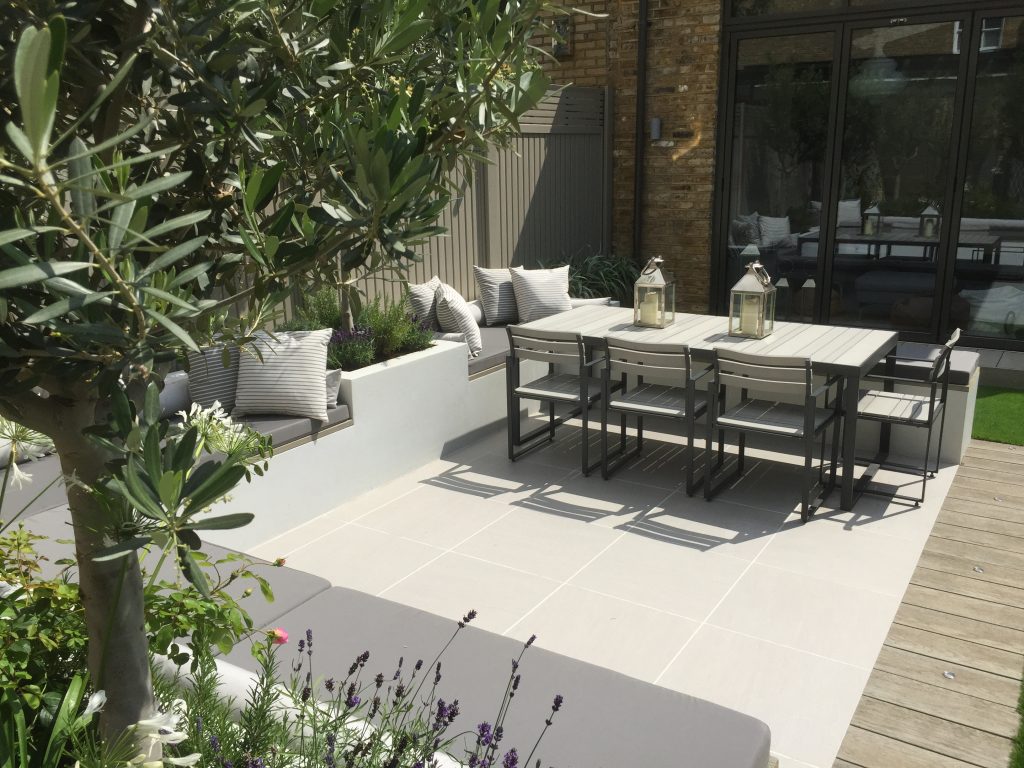
Low porosity
Porcelain is made of heavily compacted materials and fired to a very high temperature. This transforms them into paving slabs that absorb very little water (ours have a maximum of 0.05% porosity) and therefore highly stain-resistant. It also makes them frost-proof and resistant to algae. Sealing is sometimes recommended, but is usually not necessary
Very robust
The high firing temperature makes them exceptionally robust and highly scratch-resistant. Porcelain and ceramic tiles are often lumped together, but ceramic tiles are fired at a much lower temperature, are less robust and more likely to crack.
Full body colour
The manufacturing process of Italian porcelain paving means that colour is not, as with some tiles, superficial. When cut, the tile is the same colour throughout, so exposed and profiled edges blend in nicely and, in the unlikely event that one is chipped, damage is virtually invisible.
Rectified edges
Precision-cut, pavers make installation speedier. The lack of dimensional tolerance allows the use of tile spacers when laying, and results in the very even pointing that fits so well in modern garden design.
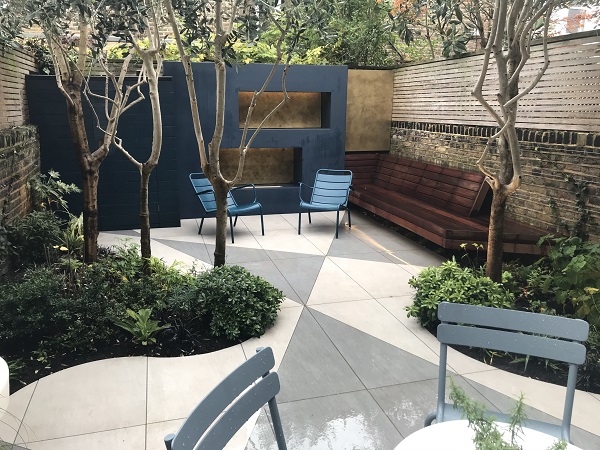
What designers think of porcelain paving
Designer Nic Howard told us how happy he is with porcelain. “It looks like natural stone and has all the attributes of natural stone without the downside." For his trade stand garden for David Harber, he laid 2.5mm joints. "I could get away with that because there's absolutely no tolerance.”
For his trade stand garden for David Harber Nic Howard laid 2½ mm joints and, as he says, “could get away with that because there’s absolutely perfect tolerance.”
Designer Tom Howard, earlier this year, told us, ““The chap who lays it loves using it because it’s so consistent and laying is easier.”
And Chris Harrington said, “We’re using it more and more. We would always use Porcelain as our first choice. It’s less messy to cut, though you do need skill and the right equipment.”
See how designers have used porcelain paving in award-winning show gardens.
Create your own bespoke design
Having our own Bespoke Stone Centre means that we get to learn for ourselves everything you need to know about working with different paving materials.
Because it’s so hard, porcelain is not the easiest material to work with. However, with the knowledge and expertise of our skilled team of operatives, we created an industry "first" by matching our entire porcelain paving range with step treads and coping, made in-house, with a wide choice of edge profiles, including 40mm bullnose. This way we provide a complete porcelain "package" - we'll even engrave it!
Here to help you
We work with porcelain daily, so if you'd like tips on how to cut porcelain, we're here to help. And we've ensured that our porcelain ranges cater for all budgets and, with all covered by our 10-year porcelain paving guarantee, you know your paving for patios, paths or driveways will look good for many years to come.
Porcelain may sound delicate, but it's one of the toughest pavings available. It's robust enough for all uses, including driveways and high-traffic areas (where its stain resistance comes into its own). Check out our ten reasons to choose an outdoor porcelain tile for more information.
Or visit our porcelain ranges to see what we have to offer.
Updated: April 2024


/filters:quality(60)/mediadev/media/menu-pics/all-porcelain.jpg )
/filters:quality(60)/mediadev/media/menu-pics/luxury-italian.jpg )
/filters:quality(60)/mediadev/media/menu-pics/premium-italian.jpg )
/filters:quality(60)/mediadev/media/menu-pics/budget-porcelain.jpg )
/filters:quality(60)/mediadev/media/menu-pics/large-format-porcelain.jpg )
/filters:quality(60)/mediadev/media/menu-pics/wood-effect-porcelain.jpg )
/filters:quality(60)/mediadev/media/menu-pics/porcelain-planks.jpg )
/filters:quality(60)/mediadev/media/menu-pics/porcelain-setts.jpg )
/filters:quality(60)/mediadev/media/menu-pics/browse-all-paving.jpg )
/filters:quality(60)/mediadev/media/menu-pics/stone-paving.jpg )
/filters:quality(60)/mediadev/media/menu-pics/interior-tiles.jpg )
/filters:quality(60)/mediadev/media/menu-pics/stone-effect-porcelain.png )
/filters:quality(60)/mediadev/media/menu-pics/wood-effect-porcelain.png )
/filters:quality(60)/mediadev/media/menu-pics/grey-porcelain.png )
/filters:quality(60)/mediadev/media/menu-pics/beige-porcelain.png )
/filters:quality(60)/mediadev/media/menu-pics/dark-porcelain.png )
/filters:quality(60)/mediadev/media/menu-pics/light-porcelain.png )
/filters:quality(60)/mediadev/media/menu-pics/patio-grout.jpg)
/filters:quality(60)/mediadev/media/menu-pics/primers.jpg)
/filters:quality(60)/mediadev/media/menu-pics/porcelain-blades.jpg)
/filters:quality(90)/mediadev/media/menu-pics/drainage.jpg)
/filters:quality(60)/mediadev/media/menu-pics/cleaners.jpg)
/filters:quality(60)/mediadev/media/menu-pics/all-stone-paving.jpg )
/filters:quality(60)/mediadev/media/menu-pics/all-sawn-paving.jpg )
/filters:quality(60)/mediadev/media/menu-pics/all-riven-paving.jpg )
/filters:quality(60)/mediadev/media/menu-pics/indian-sandstone.jpg )
/filters:quality(60)/mediadev/media/menu-pics/limestone-paving.jpg )
/filters:quality(60)/mediadev/media/menu-pics/granite-paving.jpg )
/filters:quality(60)/mediadev/media/menu-pics/slate-paving.jpg )
/filters:quality(60)/mediadev/media/menu-pics/yorkstone-paving.jpg )
/filters:quality(60)/mediadev/media/menu-pics/stone-pavers.jpg )
/filters:quality(60)/mediadev/media/menu-pics/cobbles-setts.jpg )
/filters:quality(60)/mediadev/media/menu-pics/plank-paving.jpg )
/filters:quality(60)/mediadev/media/menu-pics/paving-circles.jpg )
/filters:quality(60)/mediadev/media/menu-pics/bespoke-paving-1.jpg )
/filters:quality(60)/mediadev/media/menu-pics/edging-stones-1.jpg )
/filters:quality(60)/mediadev/media/menu-pics/prestige-stone.jpg )
/filters:quality(60)/mediadev/media/menu-pics/grey-blue-stone.png)
/filters:quality(60)/mediadev/media/menu-pics/swatch-black-dark.jpg )
/filters:quality(60)/mediadev/media/menu-pics/swatch-buff-beige-white.jpg )
/filters:quality(60)/mediadev/media/menu-pics/sealants.jpg)
/filters:quality(60)/mediadev/media/menu-pics/all-clay-paving.jpg )
/filters:quality(60)/mediadev/media/menu-pics/alpha-clay-pavers.jpg )
/filters:quality(60)/mediadev/media/menu-pics/cottage-garden-clay-pavers.jpg )
/filters:quality(60)/mediadev/media/menu-pics/kessel-garden-clay-pavers.jpg )
/filters:quality(60)/mediadev/media/menu-pics/artisan-clay-pavers.jpg )
/filters:quality(60)/mediadev/media/menu-pics/grey-blue-clay-paver.png )
/filters:quality(60)/mediadev/media/menu-pics/red-brown-clay-pavers.png )
/filters:quality(60)/mediadev/media/menu-pics/beige-buff-clay-pavers.png )
/filters:quality(60)/mediadev/media/menu-pics/composite-decking.jpg )
/filters:quality(60)/mediadev/media/menu-pics/designboard-decking.jpg )
/filters:quality(60)/mediadev/media/menu-pics/classic-designboard.jpg )
/filters:quality(60)/mediadev/media/menu-pics/brushed-designboard.jpg )
/filters:quality(60)/mediadev/media/menu-pics/grooved-designboard.jpg )
/filters:quality(60)/mediadev/media/menu-pics/millboard-decking.jpg )
/filters:quality(60)/mediadev/media/menu-pics/grey-decking.jpg )
/filters:quality(60)/mediadev/media/menu-pics/black-charcoal-decking.jpg)
/filters:quality(60)/mediadev/media/menu-pics/brown-decking.jpg)
/filters:quality(60)/mediadev/media/menu-pics/all-build-deck.png )
/filters:quality(60)/mediadev/media/menu-pics/stone-cladding.jpg )
/filters:quality(60)/mediadev/media/menu-pics/all-garden-walling-1.jpg )
/filters:quality(60)/mediadev/media/menu-pics/facing-bricks.jpg )
/filters:quality(60)/mediadev/media/menu-pics/garden-screening.jpg )
/filters:quality(60)/mediadev/media/menu-pics/all-steps-coping.jpg )
/filters:quality(60)/mediadev/media/menu-pics/stone-garden-steps.jpg )
/filters:quality(60)/mediadev/media/menu-pics/sawn-steps.jpg )
/filters:quality(60)/mediadev/media/menu-pics/riven-steps.jpg )
/filters:quality(60)/mediadev/media/menu-pics/yorkstone-steps.jpg )
/filters:quality(60)/mediadev/media/menu-pics/bespoke-steps.jpg )
/filters:quality(60)/mediadev/media/menu-pics/porcelain-steps.jpg )
/filters:quality(60)/mediadev/media/menu-pics/off-the-shelf.jpg )
/filters:quality(60)/mediadev/media/menu-pics/stone-coping.jpg )
/filters:quality(60)/mediadev/media/menu-pics/sawn-coping.jpg )
/filters:quality(60)/mediadev/media/menu-pics/riven-coping.jpg )
/filters:quality(60)/mediadev/media/menu-pics/yorkstone-coping.jpg )
/filters:quality(60)/mediadev/media/menu-pics/bespoke-coping.jpg )
/filters:quality(60)/mediadev/media/menu-pics/stone-pier-caps.jpg )
/filters:quality(60)/mediadev/media/menu-pics/porcelain-coping.jpg )
/filters:quality(60)/mediadev/media/menu-pics/all-bespoke-services.jpg )
/filters:quality(60)/mediadev/media/menu-pics/bespoke-paving-2.jpg )
/filters:quality(60)/mediadev/media/menu-pics/bespoke-steps-1.jpg )
/filters:quality(60)/mediadev/media/menu-pics/bespoke-coping-1.jpg )
/filters:quality(60)/mediadev/media/menu-pics/edge-profiles.jpg )
/filters:quality(60)/mediadev/media/menu-pics/masonry-services.jpg )
/filters:quality(60)/mediadev/media/menu-pics/deluxe-pergolas.jpg )
/filters:quality(60)/mediadev/media/menu-pics/proteus-pergolas.jpg )


